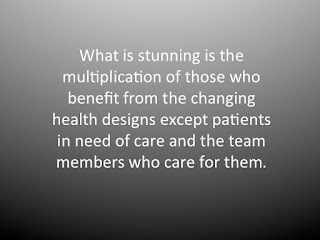Basic Health Access Recent Blog Posts
Policy and Design Seeds of Health Improvement Fail on Barren US Soil - Any number of interventions can work in a nation that invests in children, and improved environments, situations, and social determinants. In nations failing in support, health interventions can be expensive and can fail to work. Medicaid as Savior or Betrayer of Access - Higher payments from Medicaid can increase access for patients with or without insurance. Medicaid expansion with current payments too low cannot support Medicaid patients, local providers where care is needed, or patients with insurance either. Selling and Swelling a Bigger HITECH Bubble - C herry pi cking has become essential for those who provide or insure health care. Choose the easiest route will capture more dollars with less cost of delivery - and this will earn more bonuses and assure no penalties. Changes since 2010 will reward those already doing well and will penalize those already behind. Cherry picking has apparently moved ...


